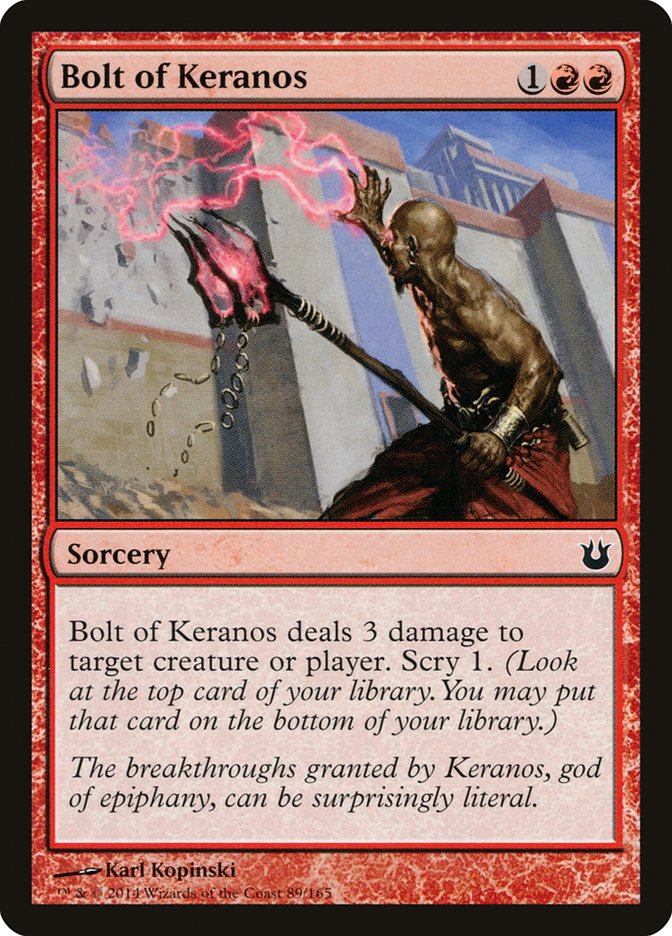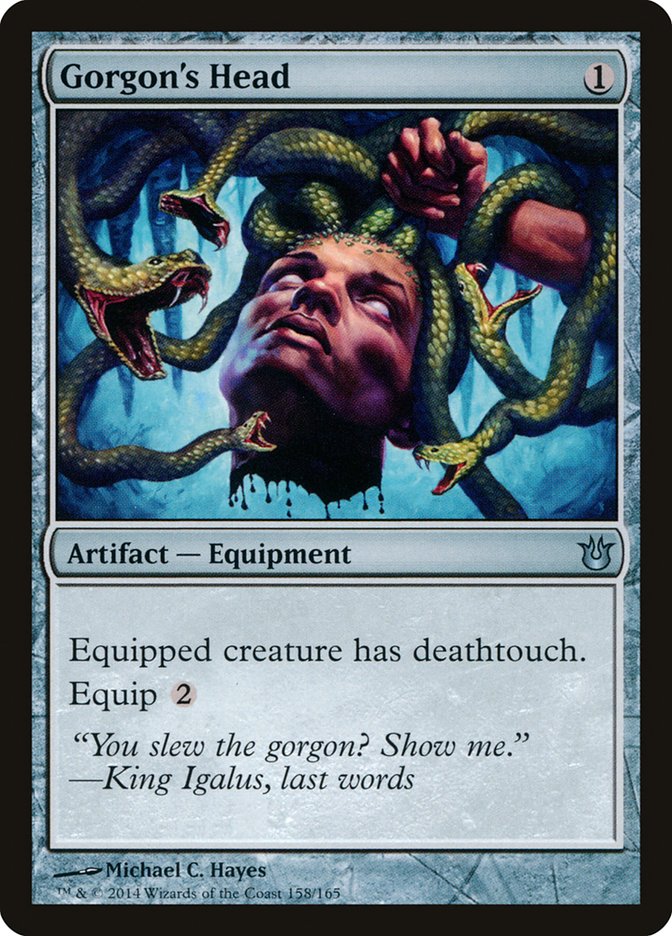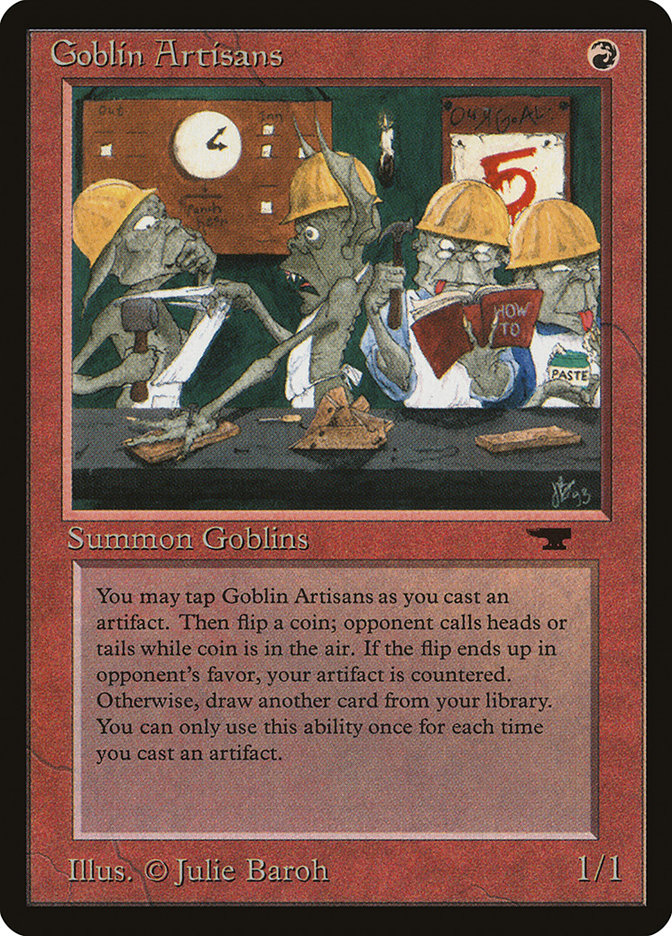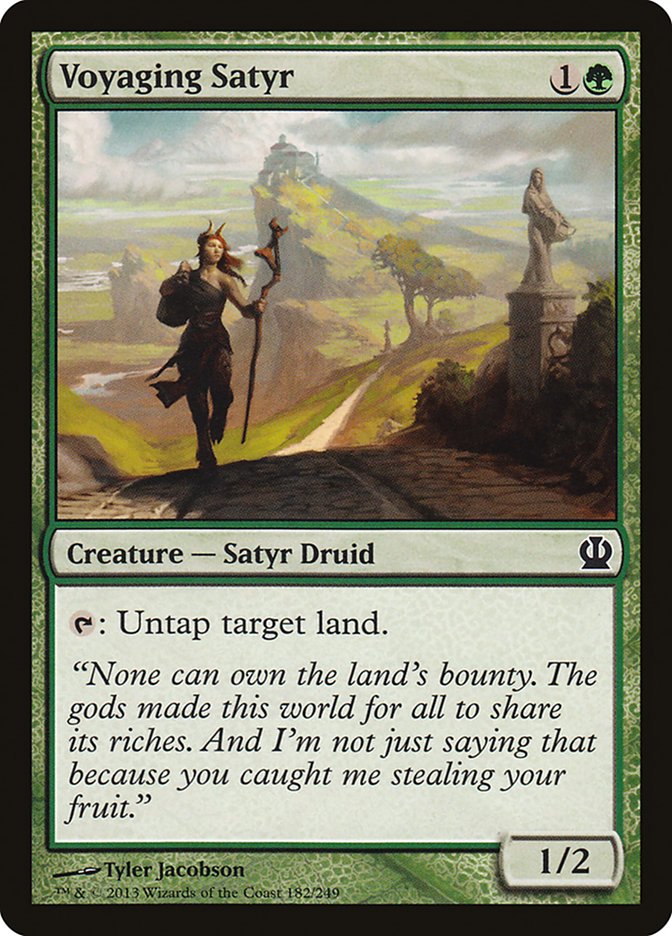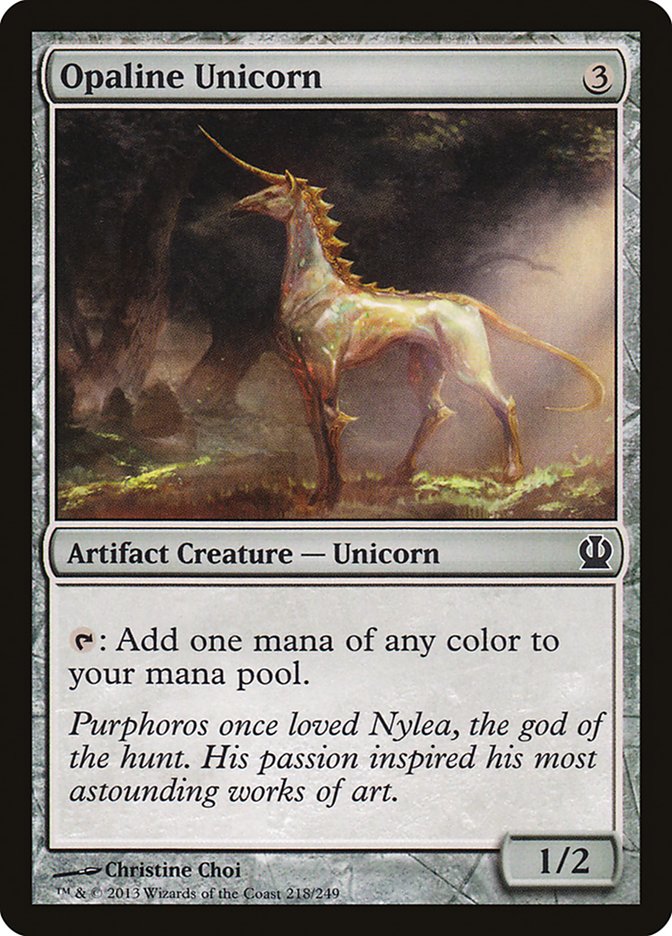This article has been kicking around in the back of my head for a while. An acquaintance of mine lamented that in Theros block, there just isn’t much
“funny.” All in all, I have to agree. When cards like Bolt of Keranos and Gorgon’s Head are the most obvious representatives of humor in a set, as my
acquaintance suggested for Born of the Gods, something’s gone wrong with the balance of funny and heavy.
Lorwyn/Shadowmoor is my benchmark for “too far” in either direction; Lorwyn was unrelentingly twee, Shadowmoor just as grimdark. The world of Theros
doesn’t go to Shadowmoor’s extremes, but it does lean heavily on the tragedy. While tragedy is an integral part of ancient Greek literature as they knew it
and we perceive it, it is far from the whole of classical drama. The actors’ masks that hang in high
school auditoriums do not both weep. Comedy and laughter as Western audiences know it got their start in Greek theater, from the broad “Old Comedy” of Aristophanes that inspired so much later Eurpoean stage buffoonery to the ” New Comedy” that is the direct ancestor of today’s sitcoms.
“Ah,” my straw opponent says, “but Theros is themed around Greek myth, not Greek theater!” Well, straw opponent, I’ll counter with Zeus and Hera,
the prototypes for the straying husband and the jealous wife in so many stories. Granted, the stories weren’t particularly funny to the many women who were subjected to Zeus’s advances (when an immortal pursues a mortal,
consent is dubious at best) and then the retribution of the divine harridan Hera, but such foibles were part-and-parcel of the body of the region’s
collected myths.
At the intersection of Magic and Greek myth, there were plenty of chances to bring the funny, but most were left untaken. What were the decisions that made
Theros block so serious, and what might have been?
Goblins Replaced by Neutered Satyrs
Goblins are Magic’s go-to spice for broad humor. From Goblin Artisans to Goblin Diplomats, the stupid-but-occasionally-cunning creatures have injected a
certain brand of funny into the game.
Goblins, which have a much closer connection to Anglo-Saxon and Western Continental folklore than anything in ancient Greek myth, weren’t a good match for
the Theros setting. What was lying around as a suitable replacement for the short-term thinking, the lack of caring about the consequences, and the
occasional cunning mixed with a lot of dumb? The satyr.
Unfortunately, satyrs as they exist in Greek myth and the primary audience for Magic do not mix at all.
Two of the three major criteria of the main audience of Magic, “American” and “ages 13 and up,” are severe constraints on the satyrs of Magic. Prudery
dictates that the frat-boy dimensions of the satyrs be tap-danced around, much as the radio/TV Western serial Gunsmoke never came out and said
that
Marshal Dillon’s lady-friend Miss Kitty practiced the world’s oldest profession
.
So the Temple of Abandon seems a civilized affair with nothing more risque than a hand on a shoulder. The Satyr Hedonist is a creeper with his name and that face, while Firedrinker Satyr gives a hint of some of the naughtier goings-on at revels (what happens in the Bakkeia, stays in the Bakkeia),
but the drunkenness and debauchery that are the satyrs’ reason for being are kept remarkably low-key.
On top of all that, what are the two funniest lines given to satyrs?
Voyaging Satyr finds a bit of understated humor, while Wild Celebrants goes for the “goblin” role of “me smash stuff.” That’s not enough to make up for the
usual goblin level of humor; even Kamigawa, with its shell-backed akki goblins, found the funny in them.
It’s possible to do humorous satyrs without resorting to their usual drunken pursuit of sex partners. Disney pulled it off in its 1997 film Hercules, where the satyr Phil (short for Philoctetes) is the young hero’s
trainer. (Your obligatory musical training montage.) One may disagree with the choice to make
Phil a sarcastic ex-retired-coach type, as with many of the other choices made for that film, but the point is that Disney was able to find G-rated humor
for the satyr (and a great big smooch at the end from the goddess of love).
Speaking of…
Where Is the Love?
In “On the Fictional Religions of Magic,” at the end I
pointed out that while there were two gods of war on Theros, there was no god of love. Yet how many times has Cupid’s arrow (and yes, I used the Roman name
here rather than the Greek Eros) been responsible for great comedy?
Most of the ancient Greek New Comedy has come down secondhand through the work of a Roman playwright, Plautus, who gleefully pillaged the work of great writers such as Menander for source material. In
Plautine works such as “The Haunted House” (and in the major surviving Greek New Comedy play, ” The Grouch“), various permutations of the boy-meets-girl plot act as frames for the jokes, and after
various trials such as misunderstanding fathers, lecherous old men, and the like, the two lovebirds get to settle down and know each other.
Of course, love in ancient Greek storytelling did not always have a happy ending. (To give one example, the Magic short story “Emonberry Red” is an adaptation of the Greco-Roman myth of Pyramus and Thisbe, who were the original Romeo and Juliet.) Even so, the Theros setting’s
neglect of the humorous side of love cut off another venue for comedy.
Mark Rosewater suggested on his Tumblr that
if Theros had a love god, it would be mono-red.
Indeed, on one of the only two cards in Theros block to speak of romantic love in its flavor text, Opaline Unicorn indicates that mono-red god Purphoros
once was in love with mono-green god Nylea and that he was at his most creative when he was in love. It’s a beautiful, brittle hint of what might have
been.
Another hint of what might have been: a Xenagos-type who peacefully slid into the R/G role of the pantheon, spreading a message of merriment across the
land, providing the “All She Wants to Do Is Dance” side of the population with a
reason to boogie in the face of hydras and minotaurs, and slinging love-darts at the rest of the pantheon to make their lives a little more fun and a lot
more uncomfortable. Such a Red-Green god would have to do a lot of traveling, though, because…
The Gods Don’t Talk Much to Each Other
Or perhaps they do, but it doesn’t get shown much.
They hang out in Nyx, the starry realm of dreams, but several members of the pantheon seem to keep to themselves. Athreos, God of Passage doesn’t give two
honey badgers about the other divinities’ dramas, as suggested by Aegis of the Gods. Kruphix, God of Horizons is the divine babysitter, at one point
shutting the pantheon up in their playpen when they get too bratty. Phenax, who could’ve been hilarious as the divine black (and blue) sheep among the
gods, is instead a serious loner jerk.
With the exception of the informed former love Purphoros had for Nylea (and from the description of how Nylea lets Purphoros burn her forests when
necessary, there may be an old flame still going strong), the gods just don’t interact much. For the most part they aren’t family and there’s none of the
attendant complication to make things funny. Unlike the Greek war god Ares, who was the butt of many jokes even as heslept his way across Greece and Olympus (including getting caught in an adulterous affair by a jealous husband), the divine
twins Iroas and Mogis aren’t presented as doing much except hating each other and going for the throat.
Even in the midst of the early great epics, there was humor in how the gods were presented. In the Iliad , for instance, the goddess of discord Eris was irked at being left off the guest list for the divine equivalent of a shotgun wedding. She showed
up uninvited and chucked a golden apple labeled “for the fairest” into the crowd, and soon enough three goddesses were fighting over it. The three appealed
to Zeus for a decision, and he, in a rare moment of wisdom, decided he didn’t want any part of that; whatever his decision, he’d be ticking off
two-out-of-three among his wife and two daughters.
Instead, Zeus appointed a mortal prince, Paris, to decide. The Judgment of Paris led to the three goddesses offering bribes in exchange for the apple; the
winning bribe, offered by Aphrodite, was the most beautiful woman in the world, Helen. She was already married to the king of Sparta, but Paris didn’t let
that stop him…and in order to get his wife back, the king of Sparta started the Trojan War.
Most great serious literature has some humor in it. Shakespeare’s tragedy of Hamlet has the gravediggers, Dante’s Inferno has
demons who fart as a military signal, and so on. Theros started off as a cool, if serious, look at a Greek-inspired world, but amid all the tragedy, it
never found enough comedy. Born of the Gods was, if anything, even heavier, and by the time Journey into Nyx rolled around, it wasn’t funny anymore.
I’ll look on the bright side, though. In Magic 2015, if nothing goes wrong, we’ll get our goblins back.

